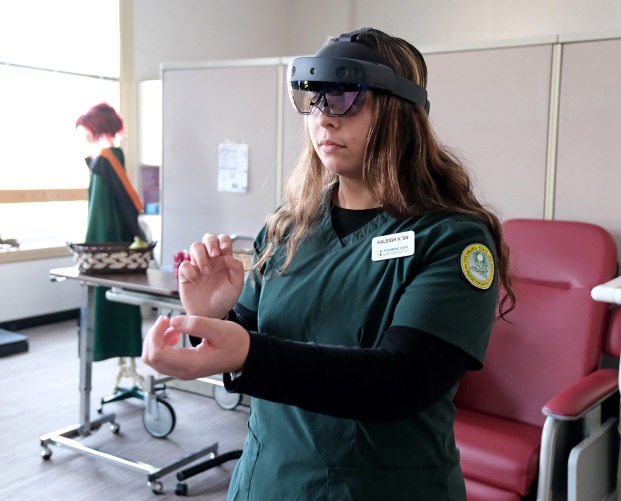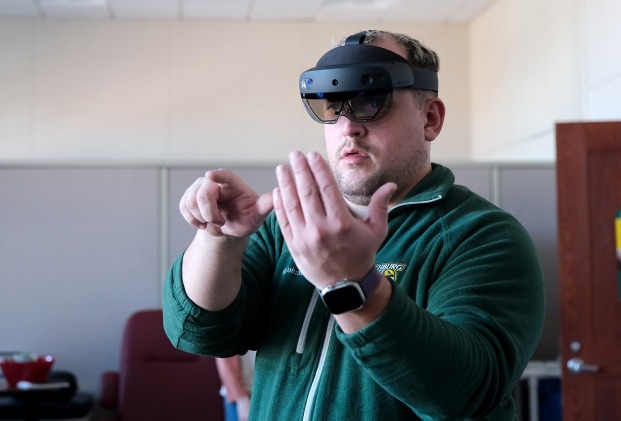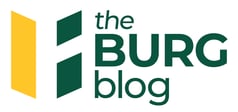
Nursing students at Fitchburg State University will benefit from cutting edge technology and next-level simulations thanks to generous grants from the Elaine Nicpon Marieb Charitable Foundation and the George I. Alden Trust.
The grants will fund wearable technology to let students and instructors utilize the latest augmented reality software as well as stipends for nursing and game design students to create and deploy new scenarios for nurses in training.

“This really is cutting edge,” said Associate Professor Deborah Benes, chair of Fitchburg State’s Nursing Department. “We’re giving our students the opportunity to work with equipment they never would have seen before that’s being used in the workforce right now.”
The Marieb Foundation was formed by Fitchburg State graduate Elaine (Nicpon) Marieb from the Class of 1984, a nurse turned textbook author. Her nursing-focused text on anatomy and physiology remains a key volume in the field, according to Professor Benes.
 Ryan Aker
Ryan Aker
With the grant funds, Fitchburg State has invested in technology from Gig XR, creators of a holographic healthcare training platform wherein students and faculty may interact with lifelike virtual patients in augmented reality. Wearing special headsets, the students can see and interact with virtual patients in the classroom or simulation lab, as well as analyze anatomy and physiology.
“Elaine Marieb’s emphasis as an educator and author was innovation, she continually strived to improve the learning experience and to approach nursing education from a student’s perspective,” said Martin Wasmer, chair of the Marieb Foundation.
Benes adds, “I think that’s what keeps her work so relevant. We have to keep growing and changing.”

The George I. Alden Trust has also been a foundational partner in Fitchburg State’s commitment to ensure its nursing students graduate career-ready. The latest grant, supporting the investment in virtual and augmented reality technology, is the second such funding from the Alden Trust dedicated to excellence in nursing at Fitchburg State. The grants recognize the university’s regional role as a powerful driver of workforce development.

A team from Gig XR recently came to campus to begin training students and staff on the technology and its potential. Nursing students Kaleigh Visbaras and Ryan Aker will be among those working with game design student James Livingstone to design simulations that will be used by future students. The students will be paid for their contributions through the Marieb Foundation grant.
Visbaras, a senior from Somerset, said her first reaction upon trying out the headsets was envy.
“I am so jealous of the nursing students who will be here next year, and beyond,” she said. “It will be so helpful for students. There are so many options that GigXR will help you explore.”
Visbaras said she found the augmented reality interface very intuitive to use, and predicts her fellow students will quickly get accustomed to the technology and use it to accelerate their learning and understanding.

“We all learn in different ways,” she said. “This will really help visual learners. In a scenario, when you figure out what’s wrong is the best feeling in the world. You’re thinking on the spot and using abilities you didn’t think you had. It’s like a mystery game, and this will be great for students just building that foundation.”

Aker, a senior from Templeton, agreed. “As a visual learner, this technology would have absolutely enhanced my learning as a student tenfold,” he said. “This technology has the potential to be great for students, and for patients.”
Aker is a non-traditional student, who came to Fitchburg State after 10 years in the Army. He began his medical training in the military, and looks forward to completing his bachelor’s degree in nursing this semester. “It’s one of those careers where you can do so many different things, from critical care to mental health. And there are always job opportunities.”
Visbaras and Aker are hopeful they can lend their insights to the creation of meaningful simulations and scenarios that students can experience using the Gig XR technology.

Livingstone hopes so, too. The Raynham native is spending his capstone internship embedded in the Nursing Department, where he will be working with Visbaras, Aker and others to create simulations using the Gig XR platform.
“I’m used to working in teams with other game design students, where this will be more client-driven,” said Livingstone, who has worked during the early weeks of the semester helping to get his collaborators proficient in the tools they will be using.
He is confident the interdisciplinary skills he is developing will be helpful when he is pursuing professional opportunities after graduation.


